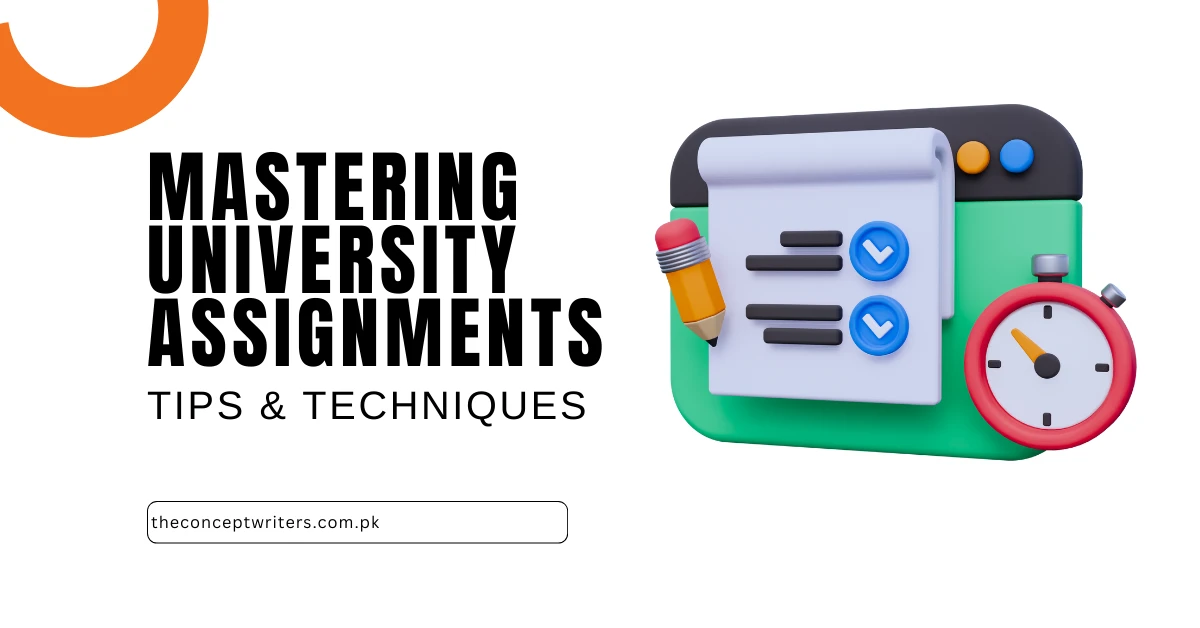Mastering University Assignments: Tips & Techniques
Assignments are a way to determine the learning curve of students. Assignments in different phases of student life have different objectives. Similarly, university assignments at different stages of academic life provide a completely different experience of learning, comprehending, processing, and enhancing your cognitive skills.
It is a continuous process that keeps on evolving with time. As a person keeps on moving towards higher studies, the level of difficulty keeps on increasing. Therefore, working on a task in college and a university assignments requires a completely different approach.
For instance, the grading methods of both are completely distinct. The difference in weightage of the task in the above two forums is evident. The toughest job is always brainstorming and finding a way to make it more interesting.
How to Write Assignments for University?
Write university assignments is a complex task. Despite it can be conquered by keeping in mind a few notable points.

Need your Academic Tasks ASAP?
Need assistance with your Academic Tasks? Help is on the way!
We will discuss them one by one below.
- Beat Procrastination
The need is to stop delaying the job that needs to be done. Start as early as possible and take a power nap in case you feel worn out. Keep yourself motivated during the process. This helps in the completion of the task before time and reduces the pressure as the clock is ticking. It gives you ample time for revision.
- Divide your Time
As we embark on a new journey, we must use time as a tool. Always carve up the time for different sections. This will help in reaching the desired targets within the allotted time. It induces a quality of working under pressure.
- Follow the Composition
The assignment should follow the structure, containing all the sections: title page, introduction, main body, conclusion, and reference list. The protocol must be followed. It must contain paragraphs, main headings, subheadings, pictorial representation, or graphs if available.
- Prepare a Rough draft
It is an initial attempt to put all your thoughts on paper. This is always useful for the final product. It helps in keeping an eye on all the key points. The chance of missing out on any of them is minimized.
- Decode your Task
This means knowing exactly the requirements of the task. What the task demands and how it needs to be catered. This is the first step of a mile.
A better understanding of the task increases the ratio of success. It will create a streamlined flow of ideas.
- Divide your Time
As you embark on a new journey, always carve up the time for different sections. This will help in reaching the desired targets within the allotted time. It induces a quality of working under pressure. Implementation of this rule will help you finish the task on time.
- Research in Depth and Brainstorm
It is vital to have a good grip on the topic. One needs to carry out extensive research and unearth all the information relevant to the assignment. Brainstorming takes over once the data has been gathered. It will enhance the thought process and problem-tackling ability. Creative thinking should always be your main weapon.
- Sketch an Outline
It is the initial plan for the execution of the task. This will help in organizing the available data and presenting it in a sequential form connecting all the dots. Moreover, highlights the main aspects to be covered in detail.
- Value Feedback
Feedback received over tasks is always valuable. Therefore, it should always be given key importance. The utmost need is to craft the assignment in the best possible manner. Sometimes it becomes difficult to predict gaps between the writing. Hence, one should get it reviewed by a teacher/ senior before submission.
- Set Realistic Goals
The task under work must achieve its goals. So it is necessary to set goals that can be achieved through the assignment. Setting up ideal goals will be a disaster for everyone. We need to support our main objective with strong evidence and proof. So that the assignment resonates with the readers as well.
- Start with an Easy One
Always start your writing with an easy topic. This will build enthusiasm towards the work. Eventually creating passion and zeal for the rest of the assignment.
- Be Crystal Clear
The writing should never contain anything that can stir mixed thoughts in the minds of the reader. The writer must always be crystal clear in expressing views regarding the topic. Every paragraph must be to the point.
- Identify your Audience
Before putting your task into black and white, one should always keep the audience in mind. This composition of the work must always be easy to comprehend for the audience. It will keep the audience curious about the topic and eventually keep them engaged. This is to keep the readers on their toes till the end.
- Writing Introductions
Effective educational writing begins with introductions and conclusions in assignments that are both clear and purposeful. The reader should understand from your introduction what will be discussed and how you plan to tackle it. The following advice is based on the specifications often needed for a written assignment, although it can also be used for other kinds of assignments.
- Proofread for Grammar
After completing the task, if you feel worn out, take some time off and then proofread the written assignment with an open mind. This will help in eliminating punctuation and grammar errors.
- Use Relevant Examples
The use of relevant examples in the assignment will make it easy to comprehend. One should try to use daily life examples to make the complexities painless for the reader.
- End with a Strong Conclusion
Your tasks should strive to have a compelling finish. Reiterating your thesis and summarizing the main arguments you used to support it should be the focus of your conclusion. As a last strong point, make a concluding sentence. Your conclusion should be roughly 10% of the entire assignment word count, just as your introduction.
You might need to devote more space to the conclusion or include a separate suggestions section before the conclusion if your evaluation work requires you to offer recommendations.
Unlock Your Academic Success with Our Expert
Struggling to meet assignment deadlines? Let our professional concept writing company in Pakistan take the burden off your shoulders! Our team of seasoned writers specializes in delivering top-notch assignments, meticulously tailored to meet your requirements and exceed your expectations.
How to Mastering University Assignments?
To ensure that you complete your university assignments on time, it’s essential that you:
- Be organized:
Try to familiarize yourself with the requirements for each of your modules’ coursework as early in the semester as possible. The majority of lecturers will give you a “course” or module outline that outlines the topics and evaluation criteria for their module. This important document, which is typically accessible through the portal, will assist you in organizing your work for the semester.
- Be motivated:
Your last exam of the semester is, at most, twelve weeks away. It’s probably going to be lot sooner than this. To prevent the agony and anxiety of a last-minute project or of going into an exam with little to no marks under your belt, it makes sense to put in some study during the entire semester. Here, it’s slow and steady that wins the race. This is a lesson you might have to learn the hard way, but it’s a tremendously powerful one.
- Be strategic:
Learn precisely what is expected of you and how to achieve the grades you desire. Ask questions if you’re unsure about what is expected of you. Additionally, spend your time wisely. It makes little sense to dedicate days of effort to a 2% assessment while ignoring a 30% examination altogether. Compare your work to the possible benefits. Another typical error is to give your first assignment an excessive amount of effort, neglecting the other assignments you have to do.
- Work with others:
Working in a study group or with a “study partner” might be beneficial when you have assignments to finish. It’s a fantastic idea to discuss your project with your peers and exchange thoughts and notes to clarify your strategy and style of thinking. It is imperative, therefore, that your task be entirely original to you. Plagiarism and other forms of copying someone else’s work are punishable.
- Allow time for reflection:
It is extremely improbable that you would finish an excellent task in a short amount of time. It could take some time for you to consider what you have done, consider how it could be better, and make any necessary adjustments. Try to finish all of your assignments as far in advance as you can to give yourself time to review and edit them before turning them in.
- If there are exceptional circumstances, request more time:
Unfortunately, unforeseen circumstances like illness, personal or family issues, or other events might throw off your best-laid plans. If you discover that you have “extenuating circumstances” that prevent you from finishing an assignment on time, notify your instructor or tutor right away and request additional time if necessary. Although they aren’t usually granted, you can always seek for deadline extensions.
- Seek and learn from feedback:
Errors are very common. They support our growth and learning. If you are confused about or dissatisfied with a coursework grade, get feedback from your instructor or tutor. After that, pay attention to, take in, and decide to implement the advice the next time around.
Conclusion
With the clock ticking down and an ocean of knowledge available at one’s fingertips. It narrows down to the concept, information, and understanding that the writer is willing to provide its audience. Do keep track of the points mentioned above and you’re good to go.

This article has shed light on university assignments. It began by focusing on how to start the assignment and break down an assignment question, then highlighted the key components to manage an assignment.
Lastly, go easy on yourself and take your best shot. Learning is all about improving.
Need your Academic Tasks ASAP?
Need assistance with your Academic Tasks? Help is on the way!
FAQ’S
What is the structure of a university assignment?
Although written university assignments come in a variety of forms, most academic writing follows a common format that includes: The introduction serves as the reader’s travel map. Body: Provide evidence to back up your claims. Conclusion: a summary of the key ideas raised.
What is the first part of the assignment?
Assignments typically start with an introduction to the subject, the phrase or words that serve as a focal point to explain the work, and some further advice, queries, or prompts to help you get going.
How many pages should a university assignment be?
Most of the time, your assignment will provide precise instructions on how many words or pages you must produce. Usually, this will be a range rather than a precise amount (e.g., 10–12 pages or 2500–3000 words). Always ask your instructor if you’re unsure.
What are the 4 types of university assignments?
Academic assignments often fall into four categories: essays, papers, case studies, and reviews. Essays: An essay is a written work that presents the author’s position and response to a specific question or issue.
Papers: Begins with a topic and a research question.
Case Study: A case study is a research approach that is used to generate an in-depth, multi-faceted understanding of a complex issue in its real-life context.
Reviews: A critical review of an article or a journal is carried out to expose oneself to a multitude of works of other authors.



